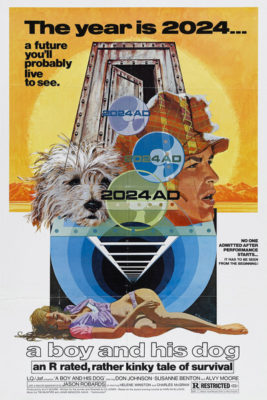
Directed by L.Q. Jones
Screenplay by L. Q. Jones, Alvy Moore, Wayne Cruseturner
Starring Don Johnson, Susanne Benton, Alvy Moore, Jason Robards
A rarely mentioned dystopian movie, A Boy and His Dog is a film based on stories by Harlan Ellison. Directed by L.Q. Jones and released in 1975, this movie revolves around a teenager who shares a telepathic link with his canine companion. The boy, played by Don Johnson, and dog, voice-over by Tim McIntire, work together to find food, shelter and romance in post-apocalyptic America.
This partnership is tested when Quilla June Homes, played by Susanne Benton, lures Vic to Downunder, a biosphere where survivors keep the American traditions alive. Vic is captured when he enters the biosphere and learns that he’s been duped by Quilla June. The leaders of Downunder plan to use him to replenish their questionable reproductive pool through a joyless medical procedure.
Vic is not the only one betrayed. Promised a political position for her part in the plan, Quilla is outraged when the leaders renege on the deal. In a desperate plan, Quilla helps Vic escape, hoping he’ll help her take over Downunder, but Vic wants no part of the scheme and battles his way back to the surface. Guilty of treason, Quilla has no choice but to follow him.
Back above ground, Quilla and Vic find Blood, the dog, nearly dead from starvation. Quilla tells Vic the old dog is beyond saving, but Vic’s ingenuity and devotion prove her wrong. In the final scene, Vic and Blood are sitting around a smoldering fire, remnants of a camp meal linger. Quilla is suspiciously absent. Assumptions of cannibalism are quantified in Blood’s final remark, “…she had marvelous judgment and particularly good taste.” Doubtlessly a double entendre.
A Boy and His Dog is a low budget, grind house delight. First-rate performances, a lean, fast-moving script, and good dialogue, more than make up for poor sets and mediocre cinematography. This film has a lot to offer, I especially like the counterculture’s influence that splashes across most scenes, and the telepathic communications between dog and boy carry the best lines of the film.
Though there are great facets to this movie, it is flawed by a fundamental, socially unacceptable element. Women are brutalized in this film by societies, both above and below ground. I get it, it’s an exploitation film, but generally speaking, in grind house fare the antagonists treat women poorly. In a very disappointing turn, Vic, the protagonist, is as guilty of brutalizing and degrading women, as the people from Downunder. An argument could be made that Vic’s character is consistent with cultures that would be created in harsh conditions, but those facets of the story could have been shifted without loss of message or zing.
by David Schultz
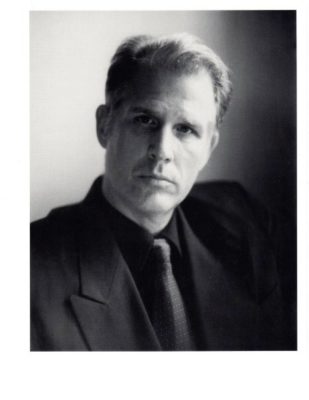 Dave Schultz has a BA in Creative Writing from Southern Illinois University. In 2013, he was nominated for the Pushcart Prize for his short story, “Colt 45” which appeared in 5th Wednesday. More recently he’s had work in Rivulets, Common line Journal, Aphelion, and has written for The Blue Billies, a live performance literary group. Dave writes in a multitude of genres, and in mainstream literary fiction. For the last 10 years he has worked as an artisan for Lakland Bass Guitar.
Dave Schultz has a BA in Creative Writing from Southern Illinois University. In 2013, he was nominated for the Pushcart Prize for his short story, “Colt 45” which appeared in 5th Wednesday. More recently he’s had work in Rivulets, Common line Journal, Aphelion, and has written for The Blue Billies, a live performance literary group. Dave writes in a multitude of genres, and in mainstream literary fiction. For the last 10 years he has worked as an artisan for Lakland Bass Guitar.
In February 2018 his story “Femme Fatale” will be in Smoky Blue Literary and Arts Magazine, which you can read by clicking here.
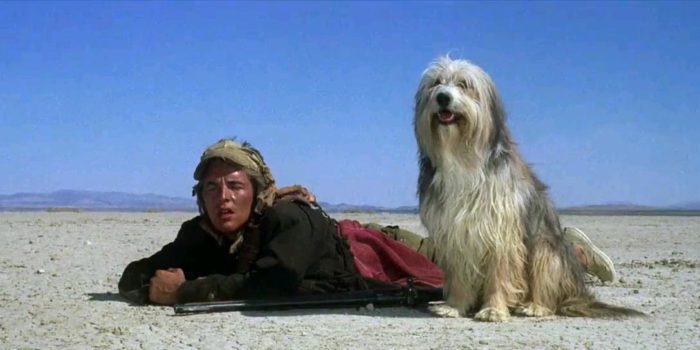
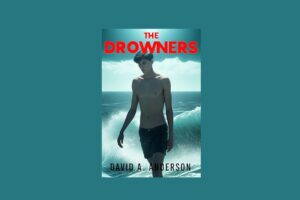
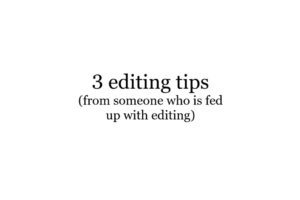

Leave a Reply